|
Got a thin skin? Then look elsewhere. Post a link to an image that you've made, and invite others to offer their critiques. Honesty is encouraged, but please be positive in your constructive criticism. Flaming and just plain nastiness will not be tolerated. Please note that this is not an area for you to showcase your images, nor is this a place for you to show-off where you have been. This is an area for you to post images so that you may share with us a technique that you have mastered, or are trying to master. Typically, no more than about four images should be posted in any one post or thread, and the maximum size of any side of any image should not exceed 950 px.
Moderators: Greg B, Nnnnsic, Geoff, Glen, gstark, Moderators
Forum rules
Please note that image critiquing is a matter of give and take: if you post images for critique, and you then expect to receive criticism, then it is also reasonable, fair and appropriate that, in return, you post your critique of the images of other members here as a matter of courtesy. So please do offer your critique of the images of others; your opinion is important, and will help everyone here enjoy their visit to far greater extent.
Also please note that, unless you state something to the contrary, other members might attempt to repost your image with their own post processing applied. We see this as an acceptable form of critique, but should you prefer that others not modify your work, this is perfectly ok, and you should state this, either within your post, or within your signature.
Images posted here should conform with the general forum guidelines. Image sizes should not exceed 950 pixels along the largest side (height or width) and typically no more than four images per post or thread.
Please also ensure that you have a meaningful location included in your profile. Please refer to the FAQ for details of what "meaningful" is.
 by Remorhaz on Mon Jan 28, 2013 10:33 am by Remorhaz on Mon Jan 28, 2013 10:33 am
Well - there isn't a lot of mystery really... this is what happens when I don't cover the viewfinder when doing a long exposure (during the day) using the ten stop ND filter (and some... + CPL + 3 stop GradND)... and I get some mystery light leakage over the image  With my D7000 I didn't really have to do this - at worst just draping the camera strap over the eyepiece was enough but I've found with the D600 I really do have to use that viewfinder cover or suffer the consequences. Perhaps it's an FX (full frame) sensor thing with a larger viewfinder, mirror box, etc? who knows - all I know is my daughter likes this one better  ... I guess it kinda does have that serendipitous random nature Aurora Borealis look to it. 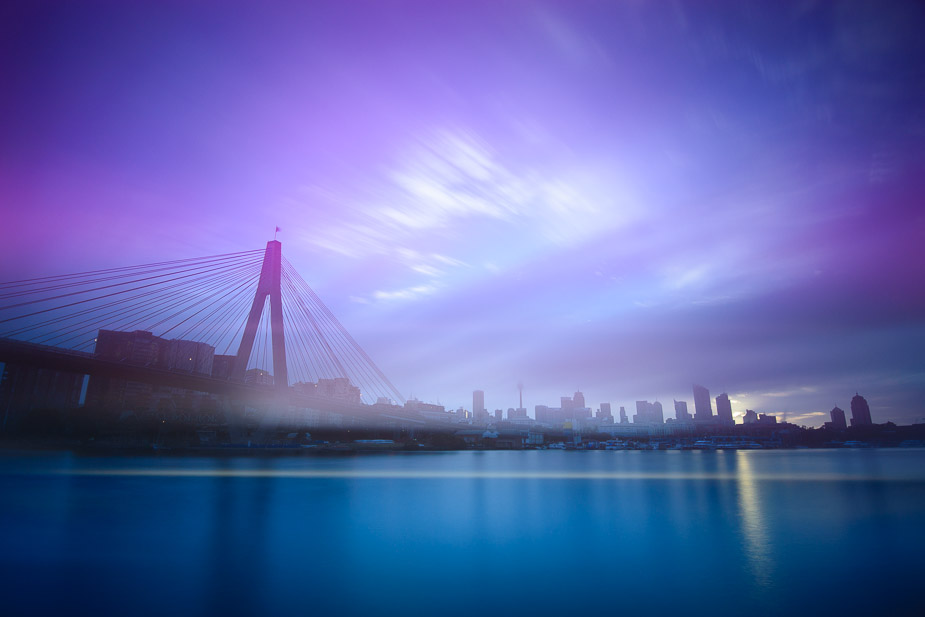 and here is the very next frame (where I used the cover) and what I was expecting to get - same exposure settings (120 sec @ f/8, ISO 400 and 19mm) with a slight change to the composition (rotated left a little to get a little more bridge in (all the wires)). These are both basically straight out of camera with the same minimal processing 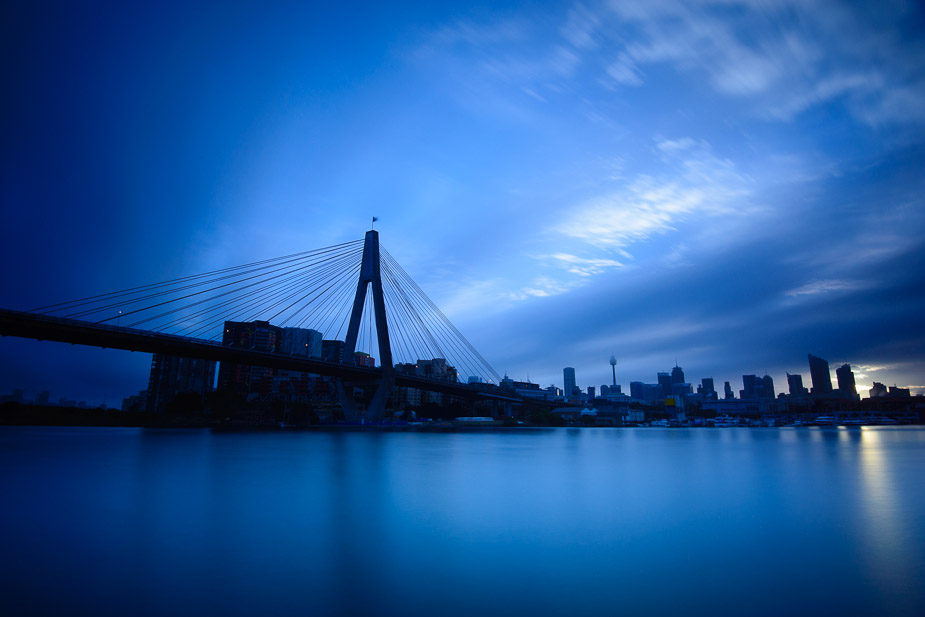 D600, D7000, Nikon/Sigma/Tamron Lenses, Nikon Flashes, Sirui/Manfrotto/Benro SticksRodney - My Photo BlogWant: Fast Wide (14|20|24)
-

Remorhaz
- Senior Member
-
- Posts: 2547
- Joined: Thu Apr 29, 2010 8:14 pm
- Location: Sydney - Lower North Shore - D600
-
 by gstark on Mon Jan 28, 2013 11:41 am by gstark on Mon Jan 28, 2013 11:41 am
Remorhaz wrote:Well - there isn't a lot of mystery really... this is what happens when I don't cover the viewfinder when doing a long exposure (during the day) using the ten stop ND filter (and some... + CPL + 3 stop GradND)... and I get some mystery light leakage over the image 
Hold on there, pardner. Are you suggesting that there was light leakage onto the sensor through the viewfinder because you left the eyepiece uncovered? Highly unlikely; the purpose of the eyepiece blind is to prevent light entering the viewfinder to affect your image's exposure settings, but when you're making the exposure, the mirror is raised up against the focusing screen, preventing any light that might be entering though the viewfinder from entering the mirrorbox, and thus affecting the actual image that you're shooting. That's why the viewfinder blacks out during the actual moments of exposure. Did you have a boat traverse the path that you were shooting in the first image? Look at the horizontal line on the water, along the the hazy area below the bridge deck; that's what I think I'm seeing there. Not sure about the artifacts in the sky, but I'd be pretty sure that they're not due to light leakage through the viewfinder. g.
Gary Stark
Nikon, Canon, Bronica .... stuff
The people who want English to be the official language of the United States are uncomfortable with their leaders being fluent in it - US Pres. Bartlet
-

gstark
- Site Admin
-
- Posts: 22926
- Joined: Thu Aug 05, 2004 11:41 pm
- Location: Bondi, NSW
 by zafra52 on Mon Jan 28, 2013 12:32 pm by zafra52 on Mon Jan 28, 2013 12:32 pm
Interesting effect, but Gary possible explanation sounds more likely. But, you could try to do it again... 
-

zafra52
- Senior Member
-
- Posts: 4884
- Joined: Thu Dec 01, 2005 10:22 pm
- Location: Brisbane
 by Remorhaz on Mon Jan 28, 2013 3:21 pm by Remorhaz on Mon Jan 28, 2013 3:21 pm
gstark wrote:Hold on there, pardner. Are you suggesting that there was light leakage onto the sensor through the viewfinder because you left the eyepiece uncovered?
I am Highly unlikely; the purpose of the eyepiece blind is to prevent light entering the viewfinder to affect your image's exposure settings, but when you're making the exposure, the mirror is raised up against the focusing screen, preventing any light that might be entering though the viewfinder from entering the mirrorbox, and thus affecting the actual image that you're shooting. That's why the viewfinder blacks out during the actual moments of exposure.
I totally understand that theory yes - however with multi minute exposures in daylight perhaps just a tiny tiny fraction gets through (and it wouldn't need to be much - with around fifteen stops happening up front you only need a leak of 1/30000 (0.003%) to make a huge difference)... BTW: This isn't the first time that this has happened - I've shot at least twice before with the 10 stop ND in daylight and same deal - mysterious purple light over the image with the viewfinder uncovered NB: I'm also not the only one to see this - David duChemin saw the same with his D800 - http://davidduchemin.com/2013/01/long-e ... ght-leaks/Did you have a boat traverse the path that you were shooting in the first image? Look at the horizontal line on the water, along the the hazy area below the bridge deck; that's what I think I'm seeing there. Not sure about the artifacts in the sky, but I'd be pretty sure that they're not due to light leakage through the viewfinder.
It's possible - cant remember - but it is the purple in the sky I'm talking about zafra52 wrote:But, you could try to do it again...
Yep - I will do a bit more testing with this to confirm - I'll use the screw in B+W 10 stop instead too to exclude the effects of strong light hitting the slot in plate filters at an angle or on the edge or something D600, D7000, Nikon/Sigma/Tamron Lenses, Nikon Flashes, Sirui/Manfrotto/Benro SticksRodney - My Photo BlogWant: Fast Wide (14|20|24)
-

Remorhaz
- Senior Member
-
- Posts: 2547
- Joined: Thu Apr 29, 2010 8:14 pm
- Location: Sydney - Lower North Shore - D600
-
 by gstark on Mon Jan 28, 2013 3:38 pm by gstark on Mon Jan 28, 2013 3:38 pm
Remorhaz wrote:It's possible - cant remember - but it is the purple in the sky I'm talking about
Yep, and no, it's not light leakage either. Look at where the sun is, and look at the shafts of light adjacent to the purple. Those shafts are all at slightly different angles, but they all appear to me to basically radiating from the same spot, in the bottom rh side of the horizon. While that doesn't appear to be where the sun is, you're shooting at an extremely wide angle, and the sun appears to stll be below the horizon; what we may be seeing here is the diffraction that occurs at just before sunrise, and just after sunset; the sun is below the horizon, but because of atmospheric conditions, we can see (a reflection of) it.  And I don't accept that there's any light leakage into the mirror box. I'd need more than this - which is all explainable - to convince me of that. g.
Gary Stark
Nikon, Canon, Bronica .... stuff
The people who want English to be the official language of the United States are uncomfortable with their leaders being fluent in it - US Pres. Bartlet
-

gstark
- Site Admin
-
- Posts: 22926
- Joined: Thu Aug 05, 2004 11:41 pm
- Location: Bondi, NSW
 by Matt. K on Mon Jan 28, 2013 3:57 pm by Matt. K on Mon Jan 28, 2013 3:57 pm
I'm seeing some vignetting there which is not really indicitive of a light leak from any 1 side. Maybe an internal lens reflection that slowly moved across the image space? Sensor circuits heating up? Ionized radioactive haze moving across from North Korea? I'll be watching this post with interest.  Regards
Matt. K
-

Matt. K
- Former Outstanding Member Of The Year and KM
-
- Posts: 9981
- Joined: Mon Sep 06, 2004 7:12 pm
- Location: North Nowra
 by surenj on Mon Jan 28, 2013 4:33 pm by surenj on Mon Jan 28, 2013 4:33 pm
Rodney, please post images with lens cap attached
1. total darkness (many minute exposure)
2. Shine ya LED through the viewfinder (again many minute exposure)
-

surenj
- Senior Member
-
- Posts: 7197
- Joined: Fri Sep 15, 2006 8:21 pm
- Location: Artarmon NSW
 by aim54x on Mon Jan 28, 2013 5:55 pm by aim54x on Mon Jan 28, 2013 5:55 pm
Suren's test maybe something to try...I find it hard to believe that you have a viewfinder leak, your mirror covers the viewfinder when you are exposing your image.
Cameron Nikon F/Nikon 1 | Hasselblad V/XPAN| Leica M/LTM |Sony α/FE/E/Maxxum/M42Wishlist Nikkor 24/85 f/1.4| Fuji Natura BlackScout-Images | Flickr | 365Project
-

aim54x
- Senior Member
-
- Posts: 7305
- Joined: Fri Feb 01, 2008 10:13 pm
- Location: Penshurst, Sydney
-
 by Remorhaz on Mon Jan 28, 2013 8:54 pm by Remorhaz on Mon Jan 28, 2013 8:54 pm
gstark wrote:Look at where the sun is, and look at the shafts of light adjacent to the purple. Those shafts are all at slightly different angles, but they all appear to me to basically radiating from the same spot, in the bottom rh side of the horizon. While that doesn't appear to be where the sun is, you're shooting at an extremely wide angle, and the sun appears to stll be below the horizon; what we may be seeing here is the diffraction that occurs at just before sunrise, and just after sunset; the sun is below the horizon, but because of atmospheric conditions, we can see (a reflection of) it. And I don't accept that there's any light leakage into the mirror box. I'd need more than this - which is all explainable - to convince me of that.
It is possible that it's the light hitting the filters from a specific angle (on the side edges maybe) and reflecting weirdly internally - the place you draw from is near where the sun was rising - note this wasn't pre sunrise, it was slightly after - that reflection on the water on the right side is from the sun behind that building. Matt. K wrote:I'm seeing some vignetting there which is not really indicitive of a light leak from any 1 side. Maybe an internal lens reflection that slowly moved across the image space? Sensor circuits heating up? Ionized radioactive haze moving across from North Korea? I'll be watching this post with interest.
Yep to the vignetting - shots were at 19mm so pretty expected with all the filters I had on (Lee holder with bigstopper, 3 stop grad and the 105mm CPL on front) In this case it won't be the sensor heating thing - the purple shot was the first of seven consecutive multi minute bigstopper exposures and only the first was purple - the rest were all blue (as per the second image) and they would have been with a hotter sensor  surenj wrote:Rodney, please post images with lens cap attached
1. total darkness (many minute exposure)
2. Shine ya LED through the viewfinder (again many minute exposure)
aim54x wrote:Suren's test maybe something to try...I find it hard to believe that you have a viewfinder leak, your mirror covers the viewfinder when you are exposing your image.
Sounds like a plan - will do D600, D7000, Nikon/Sigma/Tamron Lenses, Nikon Flashes, Sirui/Manfrotto/Benro SticksRodney - My Photo BlogWant: Fast Wide (14|20|24)
-

Remorhaz
- Senior Member
-
- Posts: 2547
- Joined: Thu Apr 29, 2010 8:14 pm
- Location: Sydney - Lower North Shore - D600
-
 by sirhc55 on Mon Jan 28, 2013 10:08 pm by sirhc55 on Mon Jan 28, 2013 10:08 pm
There is one explanation for the purple sky. At this time of day refractions in the sky can produce different colours. Think of a sunset and a series of exposures and the colour in each one will be different.
Also, the water is blue, so my guess (and it is a guess) is sky refraction.
Chris
--------------------------------
I started my life with nothing and I’ve still got most of it left
-

sirhc55
- Key Member
-
- Posts: 12930
- Joined: Fri Sep 17, 2004 6:57 pm
- Location: Port Macquarie - Olympus EM-10
 by Remorhaz on Tue Jan 29, 2013 12:26 pm by Remorhaz on Tue Jan 29, 2013 12:26 pm
surenj wrote:Rodney, please post images with lens cap attached
1. total darkness (many minute exposure)
2. Shine ya LED through the viewfinder (again many minute exposure)
and we have some results... I setup the test as follows - I waited till it was dark (night) and then setup my camera on my desk with the following settings: - Lens cap on - Camera body set to manual focus - Manual in bulb mode with an Aperture of f/8 and ISO 100 - Used a remote interval timer set for an exposure of 3 minutes - Long Exposure Noise Reduction OFF All of the images below are straight out of camera RAW images converted to JPEG - no other adjustments made This first exposure is the baseline - the room was darkened but I used the viewfinder cover to completely block out the viewfinder for the shot - the shot is completely black as expected - the only interesting fact is that the shot appears to have no noise (even at 100%) - nice (and only one hot pixel to be found)  This second shot is the same camera position, etc - the only difference is that I removed the viewfinder cover and shone an LED torch at the viewfinder from a slight angle from about 30cm away - draw your own conclusions... 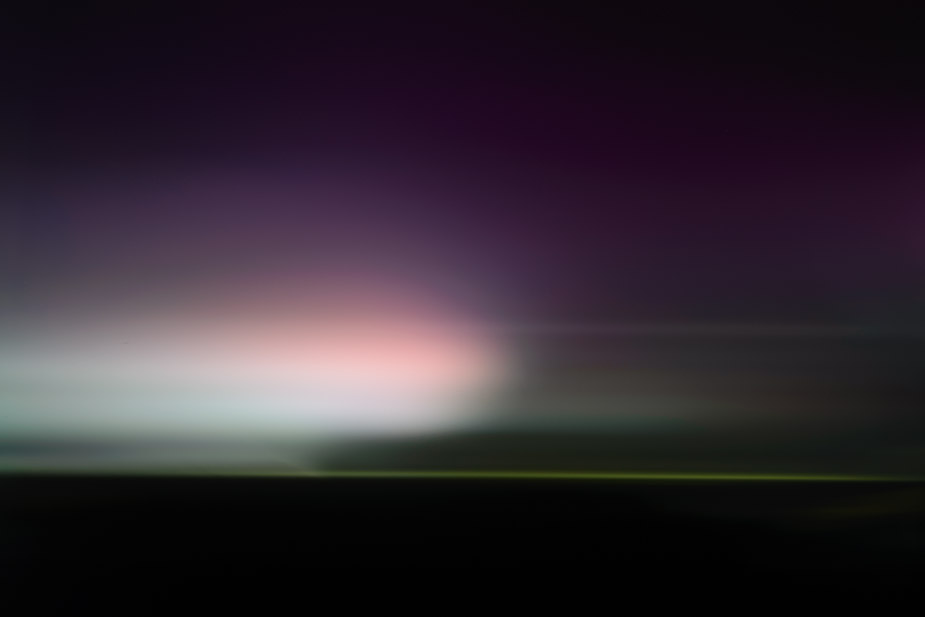 I decided to follow up with a few more tests. I took two shots with the room lights on - the first with a dimmed setting; the second with the lights (LED downlights) up higher and with the camera angled at about 30-40 degrees so the back of the camera was pointing a little more up towards the ceiling so that some of the light might spill into the viewfinder but not be pointing directly into the viewfinder. I've included the second of those tests here but essentially they were both black like this  I then pointed the camera straight down on the desk so that the ceiling downlight shone down into the viewfinder - again I should be expecting a completely black image - you can see how that turned out... 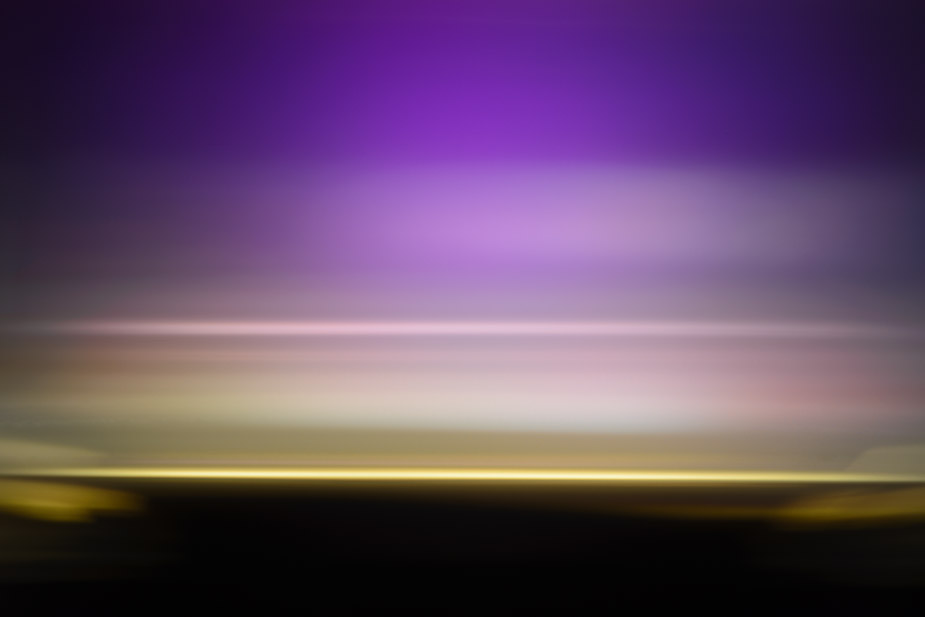 Lastly to exclude the effects of things like the sensor circuits heating up, etc (this was my sixth consecutive 3 minute exposure with almost no time between each) I took another shot with the room lights on but the viewfinder cover in place (in fact the camera was still in exactly the same position as the last shot - facing downwards on the desk with the downlight shining directly onto the back of the camera) and as you can see completely black again - and again even at 100% I see no evidence of noise (dark current, etc) and only just the one hot pixel  So seems reasonably conclusive to me. I do however intend on doing a further test - I want to see if the light leak might be happening only during the moments the mirror is being raised or lowered and so I'll try some tests like: - dark room, start the exposure with the viewfinder exposed but don't start shining a light at the viewfinder till after the mirror flips up and also stop it before the mirror flips down - as above but start the light before raising the mirror but stop before lowering - ditto but start the light after the mirror raises and stop after the mirror drops D600, D7000, Nikon/Sigma/Tamron Lenses, Nikon Flashes, Sirui/Manfrotto/Benro SticksRodney - My Photo BlogWant: Fast Wide (14|20|24)
-

Remorhaz
- Senior Member
-
- Posts: 2547
- Joined: Thu Apr 29, 2010 8:14 pm
- Location: Sydney - Lower North Shore - D600
-
 by chrisk on Tue Jan 29, 2013 12:58 pm by chrisk on Tue Jan 29, 2013 12:58 pm
That's about as conclusive as it gets. What a fantastic illustration of how important it is to think of the little things.
EM1 l 7.5 l 12-40 l 14 l 17 l 25 l 45 l 60 l 75 l AW1 l V3
-

chrisk
- Senior Member
-
- Posts: 3317
- Joined: Fri Mar 09, 2007 8:50 pm
- Location: Oyster Bay, Sydney
-
 by aim54x on Tue Jan 29, 2013 1:33 pm by aim54x on Tue Jan 29, 2013 1:33 pm
This is most interesting...let us know how it goes.....
Cameron Nikon F/Nikon 1 | Hasselblad V/XPAN| Leica M/LTM |Sony α/FE/E/Maxxum/M42Wishlist Nikkor 24/85 f/1.4| Fuji Natura BlackScout-Images | Flickr | 365Project
-

aim54x
- Senior Member
-
- Posts: 7305
- Joined: Fri Feb 01, 2008 10:13 pm
- Location: Penshurst, Sydney
-
 by gstark on Tue Jan 29, 2013 1:39 pm by gstark on Tue Jan 29, 2013 1:39 pm
Rooz wrote:That's about as conclusive as it gets. What a fantastic illustration of how important it is to think of the little things.
Indeed. And I would be talking with Nikon about a warranty repair for this. g.
Gary Stark
Nikon, Canon, Bronica .... stuff
The people who want English to be the official language of the United States are uncomfortable with their leaders being fluent in it - US Pres. Bartlet
-

gstark
- Site Admin
-
- Posts: 22926
- Joined: Thu Aug 05, 2004 11:41 pm
- Location: Bondi, NSW
 by Murray Foote on Tue Jan 29, 2013 3:20 pm by Murray Foote on Tue Jan 29, 2013 3:20 pm
I quite like the pattern on the last non-black image - maybe sandwiched with something else ....
-

Murray Foote
- Senior Member
-
- Posts: 1291
- Joined: Sun Feb 10, 2008 1:31 pm
- Location: Ainslie, Canberra
 by gstark on Tue Jan 29, 2013 4:09 pm by gstark on Tue Jan 29, 2013 4:09 pm
gstark wrote:Rooz wrote:That's about as conclusive as it gets. What a fantastic illustration of how important it is to think of the little things.
Indeed. And I would be talking with Nikon about a warranty repair for this.
Thinking a little more about this ... this is probably not a warranty issue, but rather a design compromise. IIRC, the mirror is a semi-silvered one, and this would be common throughout pretty much the whole of the Nikon - and maybe Canon - ranges. There's a secondary mirror behind the main one, so that the TTL focus (or exposure - I can't recall which) sensor can work; look in the floor of the mirror box and there'll be a small square hole which has a sensor pointing back at the image sensor located inside it. With the mirror in place for normal viewing, the secondary mirror directs light to the mirror box floor, and during exposure, it should tuck itself up against the primary mirror which should, itself, be tucked up against the focus screen. If I'm right, then this may be the cause of what we're seeing here, but the fix is really very simple and obvious: use the eyepiece blind.  g.
Gary Stark
Nikon, Canon, Bronica .... stuff
The people who want English to be the official language of the United States are uncomfortable with their leaders being fluent in it - US Pres. Bartlet
-

gstark
- Site Admin
-
- Posts: 22926
- Joined: Thu Aug 05, 2004 11:41 pm
- Location: Bondi, NSW
 by Murray Foote on Tue Jan 29, 2013 4:57 pm by Murray Foote on Tue Jan 29, 2013 4:57 pm
Reikan say to use the eyepiece blind in testing with FoCal for all applicable Nikon and Canon Cameras, so I would say it also applies to Canon.
-

Murray Foote
- Senior Member
-
- Posts: 1291
- Joined: Sun Feb 10, 2008 1:31 pm
- Location: Ainslie, Canberra
 by phillipb on Wed Jan 30, 2013 10:37 am by phillipb on Wed Jan 30, 2013 10:37 am
I'm guessing that Nikon would be well aware of this, why else would they supply a viewfinder cover, I can't think of any other reason why you would need one.
__________
Phillip
**Nikon D7000**
-

phillipb
- Senior Member
-
- Posts: 2599
- Joined: Sat Aug 07, 2004 10:56 am
- Location: Milperra (Sydney) **Nikon D7000**
 by Remorhaz on Sat Feb 02, 2013 12:32 pm by Remorhaz on Sat Feb 02, 2013 12:32 pm
gstark wrote:If I'm right, then this may be the cause of what we're seeing here, but the fix is really very simple and obvious: use the eyepiece blind. 
Murray Foote wrote:Reikan say to use the eyepiece blind in testing with FoCal for all applicable Nikon and Canon Cameras, so I would say it also applies to Canon.
phillipb wrote:I'm guessing that Nikon would be well aware of this, why else would they supply a viewfinder cover, I can't think of any other reason why you would need one.
Which is what I said at the start  - although Gary did also mention the viewfinder cover being used for setting the exposure (e.g. when on a tripod and your eye/face isn't blocking the viewfinder) so that the ambient light coming in the viewfinder doesn't alter the exposure drastically (especially for instance when using 10 stop ND's) I also did the further testing to see whether the light was only leaking in during the moments the mirror is moving up and down. Turns out this isn't the case... The following three shots were taken under the same conditions - low light room with the viewfinder cover removed - camera sitting on the desk with lens cap on and a manual shot at 30 seconds @ f/8 and ISO 100 In this first shot I waited about a second after the shutter is triggered and then shone the LED torch directly into the viewfinder for most of the exposure (20 seconds?) but ensuring I turned it off before the end (before the mirror flips up again) - as you can see it's leak city 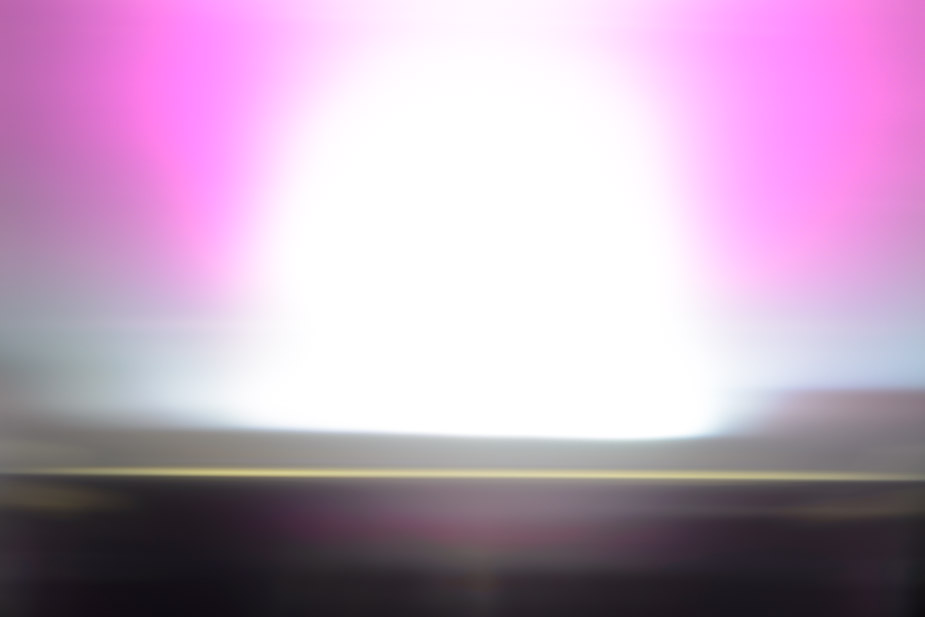 This second is the reference frame - same exposure but no torch lighting the viewfinder hole - all black as expected  and this third is similar to the first in that I triggered the shutter - waited about 5 seconds and then shone the torch briefly at the viewfinder (from further away and with less intensity) for only a few seconds (less than 5) and then stopped and waited for the rest of the 30 second exposure to complete 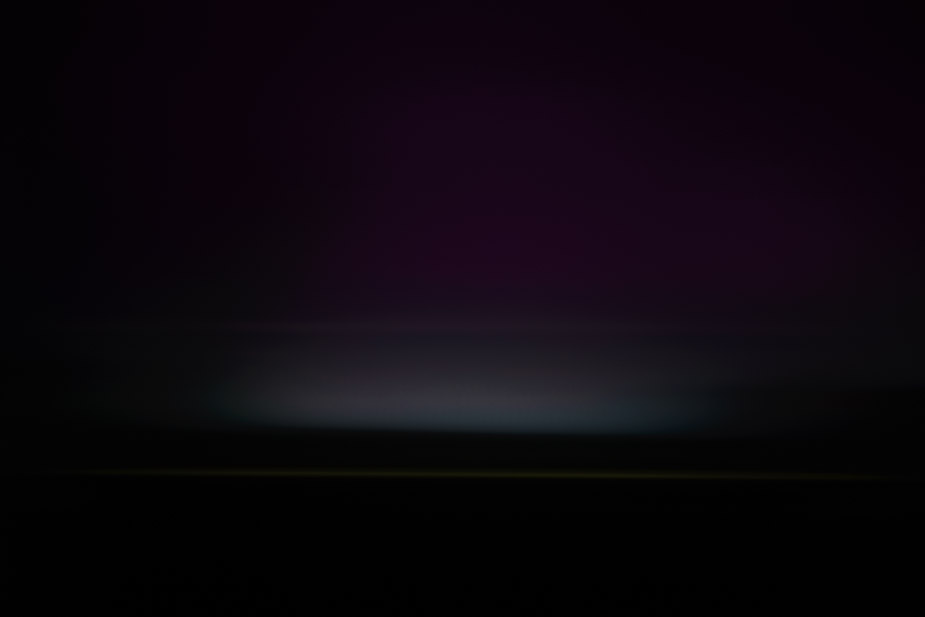 as you can see even still a faint leak is registered D600, D7000, Nikon/Sigma/Tamron Lenses, Nikon Flashes, Sirui/Manfrotto/Benro SticksRodney - My Photo BlogWant: Fast Wide (14|20|24)
-

Remorhaz
- Senior Member
-
- Posts: 2547
- Joined: Thu Apr 29, 2010 8:14 pm
- Location: Sydney - Lower North Shore - D600
-
 by Murray Foote on Sat Feb 02, 2013 2:13 pm by Murray Foote on Sat Feb 02, 2013 2:13 pm
Now the next step it to insert a mushroom cloud in the big white space and an out-of focus silhouette of the Opera House in the foreground ...
-

Murray Foote
- Senior Member
-
- Posts: 1291
- Joined: Sun Feb 10, 2008 1:31 pm
- Location: Ainslie, Canberra
 by Matt. K on Sat Feb 02, 2013 2:48 pm by Matt. K on Sat Feb 02, 2013 2:48 pm
Many of the older professional film SLR cameras came with a built in viewfinder blackout curtain, so this is simply a standard operational procedure. Use the cover/curtain, or get some black velvet and throw it over the top of the camera and let it hang over the viewfinder.
Regards
Matt. K
-

Matt. K
- Former Outstanding Member Of The Year and KM
-
- Posts: 9981
- Joined: Mon Sep 06, 2004 7:12 pm
- Location: North Nowra
 by Murray Foote on Sat Feb 02, 2013 3:15 pm by Murray Foote on Sat Feb 02, 2013 3:15 pm
View camera photography required use of a dark cloth so you could focus and compose on the ground glass screen. When I was shooting 5x4 I sometimes used to wear the dark cloth on my head using a head band. It's then conveniently ready to drop into place over the back of the camera.
If you used this technique with a DSLR you would become quite inconspicuous because no-one would be able to see your face while you were shooting. The alternative might be a full chador with a hole for the camera lens. Perhaps especially suitable for street photography of people with disconcerted expressions.
-

Murray Foote
- Senior Member
-
- Posts: 1291
- Joined: Sun Feb 10, 2008 1:31 pm
- Location: Ainslie, Canberra
 by DanielA on Sat Feb 02, 2013 9:11 pm by DanielA on Sat Feb 02, 2013 9:11 pm
Matt. K wrote:Many of the older professional film SLR cameras came with a built in viewfinder blackout curtain, so this is simply a standard operational procedure.
FYI, both my D4 and D2Xs have the built-in viewfinder curtain. It's very convenient. Daniel
-

DanielA
- Senior Member
-
- Posts: 963
- Joined: Sat Apr 02, 2005 1:23 pm
- Location: Adelaide, South Australia
-
 by chrisk on Sat Feb 02, 2013 11:16 pm by chrisk on Sat Feb 02, 2013 11:16 pm
So does the d700 and d800.
EM1 l 7.5 l 12-40 l 14 l 17 l 25 l 45 l 60 l 75 l AW1 l V3
-

chrisk
- Senior Member
-
- Posts: 3317
- Joined: Fri Mar 09, 2007 8:50 pm
- Location: Oyster Bay, Sydney
-
 by gstark on Sun Feb 03, 2013 8:36 am by gstark on Sun Feb 03, 2013 8:36 am
Murray Foote wrote:View camera photography required
Required??? Point of order, Mr Foote.  g.
Gary Stark
Nikon, Canon, Bronica .... stuff
The people who want English to be the official language of the United States are uncomfortable with their leaders being fluent in it - US Pres. Bartlet
-

gstark
- Site Admin
-
- Posts: 22926
- Joined: Thu Aug 05, 2004 11:41 pm
- Location: Bondi, NSW
 by Remorhaz on Sun Feb 03, 2013 9:42 am by Remorhaz on Sun Feb 03, 2013 9:42 am
DanielA wrote:both my D4 and D2Xs have the built-in viewfinder curtain. It's very convenient
Rooz wrote:So does the d700 and d800.
Yes unfortunately this is one of the few ways in which Nikon treats the D600 as a prosumer rather than pro camera - it doesn't have the viewfinder blind switch. It shares the same more rectangular viewfinder (with the removable eyepiece) with the consumer bodies and the slot in viewfinder cover (which I have attached to my camera strap). D600, D7000, Nikon/Sigma/Tamron Lenses, Nikon Flashes, Sirui/Manfrotto/Benro SticksRodney - My Photo BlogWant: Fast Wide (14|20|24)
-

Remorhaz
- Senior Member
-
- Posts: 2547
- Joined: Thu Apr 29, 2010 8:14 pm
- Location: Sydney - Lower North Shore - D600
-
 by zafra52 on Sun Feb 03, 2013 1:46 pm by zafra52 on Sun Feb 03, 2013 1:46 pm
Counting from the last nI quite like 3 & 5.
Intereting effects.
-

zafra52
- Senior Member
-
- Posts: 4884
- Joined: Thu Dec 01, 2005 10:22 pm
- Location: Brisbane
 by Murray Foote on Sun Feb 03, 2013 2:42 pm by Murray Foote on Sun Feb 03, 2013 2:42 pm
gstark wrote:Murray Foote wrote:View camera photography required
Required??? Point of order, Mr Foote. 
True. I stand corrected. I was only thinking of the ones I still own, an Arca-Swiss monorail and a Nagaoka field camera, not cameras with ancillary framing devices such as a Linhof Technika (which I did borrow and use once).
-

Murray Foote
- Senior Member
-
- Posts: 1291
- Joined: Sun Feb 10, 2008 1:31 pm
- Location: Ainslie, Canberra
Return to Image Reviews and Critiques
|













